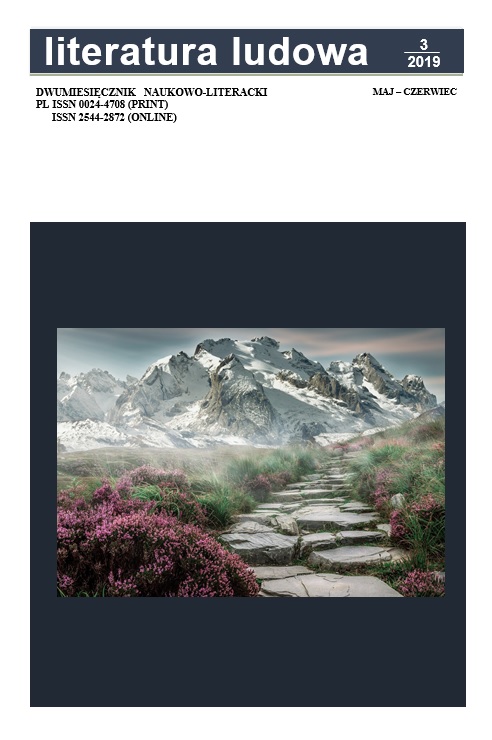Zbiór pieśni wilamowskojęzycznych z Sammlung Horak w Volksmusikarchiv des Bezirks Oberbayern w świetle najnowszych badań nad muzyką w Wilamowicach
DOI:
https://doi.org/10.12775/28702Słowa kluczowe
Wilamowice, muzyka, pieśniAbstrakt
Wilamowice były obiektem badań wielu naukowców zarówno polskich jak i niemieckich. Oprócz historii miasta badano szczególnie język, stroje i tradycje. Szczególnie niemieccy naukowcy skupieni wokół ruchu badania wysp językowych – Sprachinselforschung przyjeżdżali do Wilamowic w latach 30. i 40. w celu zbadania tutejszej kultury. Niestety, mimo iż przeprowadzili oni często dokładne badania, ich tekstom i interpretacjom przyświeca często nacjonalistyczny duch ich czasów.
Do tematów rzadko poruszanych należała muzyka w Wilamowicach. Jedynym, który zdobył się na przeprowadzenie badań terenowych był niemiecki muzykolog Karl Horak, który zebrał materiał w postaci nut i tekstów pieśni a także opublikował kilka tekstów o muzyce i tańcach tak zwanej bielsko-bialskiej wyspy językowej, do której zaliczał Wilamowice.
W 2019 roku wydana została książka „Bez muzyki, bez śpiewu, nie ma świata. Muzyka w Wilamowicach” pod redakcją dr Marii Małanicz-Przybylskiej, gdzie znalazł się aneks mojego autorstwa ze wszystkimi znanymi nam do tej pory 47 wilamowskojęzycznymi tekstami pieśni. Już po publikacji książki, odnalazłem w Volksmusikarchiv Oberbayern nieznane 20 tekstów piosenek, które Karl Horak z pomocą Alfreda Karaska zebrał w Wilamowicach w 1937 roku. W tym tekście porównuję ten zbiór do tego z moich badań, a następnie publikuję ich teksty po transliteracji na współczesną ortografię języka wilamowskiego. Staram się również zwrócić uwagę na możliwe wpływy niemiecko-narodowego punktu widzenia Horaka na interpretację tekstów.
Bibliografia
BARCIAK, A. (red.) (2001). Wilamowice. Przyroda, historia, język, kultura oraz społeczeństwo miasta i gminy. Wilamowice: Urząd Gminy.
BUKOWSKI, J. (1860). Gedichte in der Mundart der deutschen-schlesisch galizischen Grenzbewohner resp. von. Bielitz-Biala. Bielitz: Zamarski.
GARA, J. (2004). Zbiór wierszy o wilamowskich obrzędach i obyczajach. Wilamowice: Stowarzyszenie Na Rzecz Zachowania Dziedzictwa Kulturowego Miasta Wilamowice „Wilamowianie”.
GARA, J. (2007) Piosenki w języku wilamowskim. Wilamowice: nakładem własnym autora.
HAEGELE, P. (1992). Karl Horak. „Jahrbuch für Ostdeutsche Volkskunde“, T. 35, 485-487.
HORAK, G. (1983). Karasek vor Ort. Ein Bildkommentar. „Jahrbuch für Ostdeutsche Volkskunde“, T. 26, 335-337.
HORAK, K. (1956). Das Volkslied in der Bielitzer Sprachinsel. „Jahrbuch der Volkskunde der Heimatvertriebenen“, T. 2, 141-153.
HORAK, K. (1959). Der Volkstanz in den Deutschen Sprachinseln des Ostens. „Jahrbuch der Volkskunde der Heimatvertriebenen, T. 5, 247-263.
HORAK, K. (1960) Volksmusik aus Wilmesau. „Jahrbuch des Österreichischen Volksliedwerkes”, 9, 114–122.
HORAK, K. (1981). Das Tanzgut der Bielitz-Bialaer Sprachinsel, „Jahrbuch für Ostdeutsche Volkskunde”, 24, 7–62.
JABŁOŃSKA, B. (2014). Socjologia muzyki. Warszawa: Wydawnictwo Naukowe „Scholar”.
KRÓL, T. (2019). Aneks – zbiór pieśni w języku wilamowskim W: M. Małanicz-Przybylska (red.), „Bez muzyki, bez śpiewu nie ma świata” – muzyka w Wila¬mowicach (s. 169-228). Warszawa: Wydział „Artes Liberales” Uniwersytetu Warszawskiego.
KRZYŻANOWSKI, L. (2018). Część druga. Lata 1914-1945. W: L. Krzyżanowski, K. Meus, M. Fic Wilamowice 1818-2018. Miasto i ludzie (s. 39- 254). Wilamowice: Stowarzyszenie „Wilamowianie”.
KUHN, W. (1984). Eine Jugend für die Sprachinselforschung. Erinnerungen. W: Neue Beiträge zur schlesischen Siedlungsgeschichte. Eine Aufsatzsammlung, Sigmaringen, 238-275.
LATOSIŃSKI, J. (1909). Monografia miasteczka Wilamowic. Kraków: Drukarnia Literacka pod zarządem L. K Górskiego.
MAŁANICZ-PRZYBYLSKA, M. (2019). „Bez muzyki, bez śpiewu nie ma świata” – muzyka w Wilamowicach. Warszawa: Wydział „Artes Liberales” Uniwersytetu Warszawskiego.
PERKOWSKA, U. (2001). Druga wojna światowa (1939-1945). W: A. Barciak (red.), Wilamowice. Przyroda, historia, język, kultura oraz społeczeństwo miasta i gminy (s. 192 – 208). Wilamowice: Urząd Gminy.
TUREK, K., WÓJCIK, A. (2001) Folklor muzyczny. W: A. Barciak (red.), Wilamowice. Przyroda, historia, język, kultura oraz społeczeństwo miasta i gminy. Praca zbiorowa (S. 331-357). Wilamowice: Urząd Gminy.
WICHERKIEWICZ, T. (2003). The Making of a Language. The Case of the Idiom of Wilamowice, Southern Poland. Berlin-New York: Mouton de Gruyter.
ZÖCKLER, T. (1915). Das Deutschtum in Galizien. Weimar.
Pobrania
Opublikowane
Jak cytować
Numer
Dział
Licencja
Prawa autorskie/Copyright Notice
1. Autorzy udzielają wydawcy (Polskiemu Towarzystwu Ludoznawczemu) licencji niewyłącznej na korzystanie z utworu w następujących polach eksploatacji:a) utrwalanie Utworu/przedmiotu prawa pokrewnego;
b) reprodukowanie (zwielokrotnienie) Utworu/przedmiotu prawa pokrewnego drukiem i techniką cyfrową (ebook, audiobook);
c) wprowadzania do obrotu egzemplarzy zwielokrotnionego Utworu/przedmiotu prawa pokrewnego;
d) wprowadzenie Utworu/przedmiotu prawa pokrewnego do pamięci komputera;
e) rozpowszechnianie utworu w wersji elektronicznej w formule open access na licencji Creative Commons (CC BY - ND 3.0).
2. Autorzy udzielają wydawcy licencji nieodpłatnie.
3. Korzystanie przez wydawcę z utworu na ww. polach nie jest ograniczone czasowo, ilościowo i terytorialnie.
Statystyki
Liczba wyświetleń i pobrań: 746
Liczba cytowań: 0



